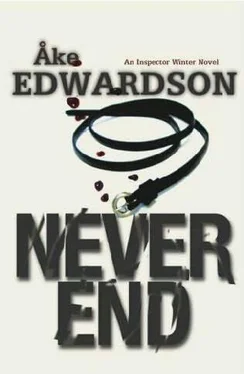"That was Mom," she said, putting her mobile back in her handbag.
"Really?"
"I live on my own now, but she always feels the need to keep an eye on me." She eyed Andy's beer. "I suppose you'll be staying here?" she said.
"Skål," Andy said.
"Right, I'm going."
"You turned your phone off, I hope?"
"What do you mean?"
"No more unwanted interruptions, if you don't mind." Andy took a drink and smiled, white, white.
No more unwanted interruptions. A few days ago she and Andy had been cuddling and might have gone further than that, but she, or maybe he, must have knocked the speed dial on her phone, and as they lay there suddenly they heard a voice, and… well, it had connected to her mom's answering machine.
Not nice.
"Thanks for reminding me! I hope that never happens again." Anne said.
She emptied her own glass, waved, went to her bike, unlocked it, and set out along the Avenue. There were more and more people, walking up and down in droves. It seemed to have grown warmer again. She was longing for a shower.
Her mobile rang, the display said "incoming call." But nobody spoke when she answered. She hung up, and put the phone back into her bag.
She turned onto the bike lane heading west. It seemed to be a little cooler once she'd left the Avenue. The smell of food wafted out of the Grand Hotel.
Winter passed on shaving. He put on a short-sleeved shirt and a pair of linen pants. Angela and Elsa were both asleep when he left at six-thirty. It was cool on the stairs. There was still a smell of paint after the renovations in early summer. He missed the ancient smell from the walls and the shiny wood of the banisters. They had always been there, ever since he had moved into the apartment ten years ago. Now it was like starting all over again. Which it was, in fact. Which means that the renovations and the new smell did fit in, he thought, as he emerged through the front door and into the balmy morning.
The Public Works Office was busy cleaning up Vasagatan, the brushes under the strange-looking contraptions scraping against the road surface and water trickling away toward the east, the same direction he was walking in. The Avenue was empty, completely empty. He could hear a streetcar, but couldn't see it.
There was no wind over Heden. The big thermometer on the wall of the building opposite said seventy-five. It was 6:50 a.m. and already seventy-five degrees. These were tropical conditions. It had been over seventy all night. When the average temperature over twenty-four hours exceeds seventy degrees, that's tropical.
He took the elevator up to his office, which was unlocked. Inside he noted the same smell as always. Nothing new there. He'd left the window ajar all night, but it hadn't made any difference.
The papers were still on his desk. His reading glasses on top. He had one pair here and another pair at home. He was starting to have problems with his long-distance vision too. Before long he'd be groping his way along walls, being guided. Pushed in a wheelchair. He was forty-one, after all.
***
A male witness had said he'd heard a scream from the park. It had been about 2:00 a.m., maybe closer to one-thirty. Half an hour to an hour after Beatrice had disappeared into the trees. The man lived nearby and was on his way home from a private party. He'd been drinking, but felt "clear in the head," as he put it, and one of the interviewers had noted that his account seemed reliable.
He'd gone into the park to investigate and passed about fifteen meters from the place where Beatrice's body had been found, but he'd neither seen nor heard anything else. He'd thought he'd heard noises before then, as if somebody was being chased. Yes, chased. A scream, or maybe two. But then nothing more.
Winter remembered the witness. He hadn't interviewed him himself, but he'd met him briefly a few days later. He recalled that the man had still seemed jumpy, or perhaps he was always like that. Jumpy.
He'd run away from the park after investigating that scream and raced to the nearest residential building, and on the sidewalk outside it he'd stopped a couple "about thirty-five years old" who had both been "dressed in white," and had told them what he'd heard. The couple had just walked through the park and the woman thought she might have seen somebody, she'd told the jumpy witness.
She thought she might have seen somebody.
The police had never spoken to her, nor to her companion. Winter remembered how they'd tried to trace that couple "dressed in white." Urged them to contact the police.
It was exactly like that business with the man and the boy packing their car in the middle of the night. It was as if they didn't exist. Perhaps the couple weren't supposed to be together at that time and in that place. Such facts tend to prevent witnesses from coming forward. Private problems, what is a murder compared to such considerations? An illicit affair. The sentence passed by society on illicit affairs is far too harsh, Winter thought. Possible unfaithfulness gets in the way of the police doing their job. Can you pass laws about morals? Something to tone down the condemnation would help, bearing in mind all the investigations that come up against a brick wall because of it.
But the man and the boy… Five years later and still not a word from them, even though neither of them could very well have forgotten packing a car in the middle of the night near a park in the center of Gothenburg.
There was something else as well.
He took off his glasses and rubbed his nose. He looked at his watch: eight o'clock. In two hours he would be seeing Jeanette Bielke at her home. He'd asked her where she'd prefer to talk, and she'd said at home.
He went to the coffee room and made himself a cup. He was the only one there. They'd canceled today's meeting. He'd have to sum up tomorrow, but everybody knew what they had to do today.
When he got back from his discussion with Jeanette, he would be expecting to know the outcome of the checks on known felons, potential suspects. They were likely to come up empty, but even that was an outcome of sorts. Elimination. This or that person couldn't have done it. Not this time. A convicted rapist had a solid alibi for that particular night. This particular murderer had been in jail. That one had been in bed asleep, with cast-iron proof. The ruthless GBH merchant had been busy beating up somebody else at that moment, but at the other end of town, or the other end of the country. Or somewhere abroad.
And so on, and so on.
The pavement outside looked white in the glow of morning. It was probably eighty-five degrees by now. Just like Marbella. He thought about his father, buried in a pretty little churchyard on the mountainside overlooking the sea at Puerto Banus, and the house in Nueva Andalucia where his mother had decided to stay put.
Winter had been present when his father died. Had attended the funeral, spent the night in the garden with the three palm trees, and eventually managed to think about nothing at all.
He returned to his office. The sun seeped in through the Venetian blinds, creating patterns on the brick walls of the corridors.
Back in his office, he stood in front of the window, smoking. It was his first of the day, after nearly two hours' work, and that was a step forward. Tomorrow he'd work for an extra fifteen minutes before his first Corps.
He sat down again and put on his glasses.
There was another thing. A woman in her twenties had been attacked and raped by a "slim" and "quite tall" man three days after the murder of Beatrice. There were similarities-but then, there always were in rape cases. This woman said she thought the man had been talking to himself when he attacked her, "mumbling," as she described it in the report Winter was holding in his hand.
Читать дальше












